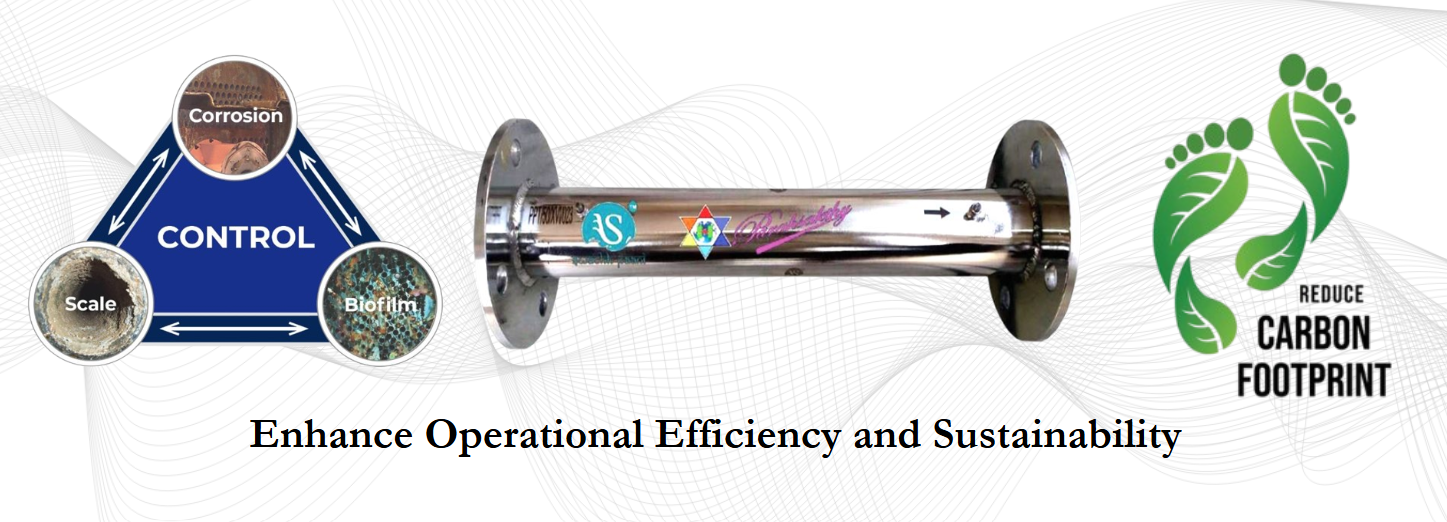Instant Solvent softener reduces Carbon Footprint and enhances Operational efficiency and Sustainability

As industries move toward greater environmental responsibility, technologies that reduce resource consumption, energy waste, and carbon emissions are essential. The Instant Solvent Softener (ISS), with its non-chemical, maintenance-free approach, is a valuable addition to sustainability initiatives within industrial and commercial facilities, particularly in cooling tower applications. In addition to enhancing operational efficiency Instant Solvent softener reduces Carbon Footprint and helps establish a sustainable foundation for operations. This article considers a closer look at how ISS supports these goals.
1. Reduction in Energy Consumption
Energy efficiency is one of the most direct ways an Instant Solvent softener reduces Carbon Footprint (Scope 2 Emissions) associated with cooling tower operations. Here’s how:
Enhanced Heat Transfer Efficiency
Scale buildup on cooling tower surfaces creates an insulating layer that impedes heat transfer. This forces cooling systems to work harder, consuming more energy to achieve the same level of cooling. Traditional methods of descaling often involve chemical treatments, but these only address symptoms rather than the root cause of scaling.
The ISS system tackles the problem by preventing the formation of scale altogether. By converting mineral deposits into aragonite rather than calcite, ISS keeps surfaces clean and unobstructed, ensuring that heat exchangers and other components operate at optimal efficiency. This results in:
- Lower Energy Requirements: Improved heat transfer reduces the need for additional energy to cool systems. Over time, the reduction in energy usage directly correlates with lower greenhouse gas emissions, particularly for facilities relying on fossil fuels for electricity.
- Extended Cooling System Efficiency: Cooling systems with reduced scale operate more efficiently and experience fewer disruptions. The cumulative effect of ISS-enabled energy savings leads to a substantial reduction in CO₂ emissions across industries, from manufacturing to HVAC-intensive sectors like commercial real estate.
Case in Point: Instant Solvent softener reduces Carbon Footprint with Reduced Energy Demand
Consider a facility with a 1,000-ton cooling tower that has reduced its energy consumption by 10% due to scale prevention from ISS. The carbon savings, when aggregated over a year, can be equivalent to preventing emissions from thousands of gallons of diesel fuel or several hundred tons of coal. For companies with multiple cooling towers or larger-scale facilities, this energy efficiency contributes significantly to overall carbon reduction targets.
2. Minimizing Chemical Usage and Disposal Impact
Traditional water softening methods, such as salt-based ion exchange systems or chemical descalers, involve the continuous use of chemicals to prevent scale. These chemicals not only incur high operational costs but also have a notable environmental impact.
Elimination of Chemical Additives
By using physical fields to alter mineral behavior, ISS eliminates the need for additional chemicals in cooling towers. This has several environmental benefits:
- Reduced Chemical Production and Transport Emissions: The manufacture, transport, and disposal of chemical water treatments contribute to the carbon footprint. By removing these from daily operations, ISS cuts down on emissions associated with the supply chain of water treatment chemicals.
- Lower Disposal Impact: Traditional softeners require disposal of chemical-laden wastewater, which can harm local water bodies and ecosystems. ISS, being a chemical-free solution, circumvents this, helping to prevent environmental pollution and contributing to a cleaner water cycle.
- Decreased Hazardous Waste Management Needs: Many facilities are obligated to handle and dispose of chemical byproducts in a responsible manner, often requiring energy-intensive waste management processes. ISS removes this need, leading to a simplified and less wasteful operation.
Contribution to Green Certifications
For facilities seeking LEED or other green building certifications, chemical-free water treatment options like ISS can be an important step toward certification. Eliminating chemicals reduces a facility’s overall environmental impact, helping it achieve sustainability benchmarks and align with international standards for green buildings.
3. Water Conservation and Reduced Environmental Degradation
Cooling towers lose water due to evaporation, but the issue is compounded when blowdown water (excess water with high mineral content) must be frequently purged to control scale and maintain water quality. ISS technology plays a crucial role in conserving water within cooling tower systems:
Extended Water Cycles
With ISS preventing the formation of scale, cooling towers can operate with longer cycles of concentration (CoC), meaning water can be recirculated through the system more times before being replaced. Higher cycles of concentration allow facilities to save on water, an increasingly precious resource in both arid and urban areas.
- Reduced Blowdown Volume: By increasing the CoC, ISS reduces the need for blowdown, minimizing water waste. The water savings contribute to operational sustainability and directly support global water conservation efforts.
- Lower Energy and Resource Usage in Water Treatment: Water savings translate into fewer resources needed for water procurement, treatment, and discharge. This is especially significant in regions where energy-intensive desalination or water transport is necessary.
Protection of Local Water Bodies
Disposing of chemical-treated water into local water bodies can contribute to water pollution and disrupt ecosystems. With ISS, there’s no need to add chemicals to prevent scale, which means there’s less risk of contaminating nearby aquatic environments.
4. Increased Equipment Lifespan and Reduced Material Waste
ISS technology extends the operational life of cooling tower components by preventing scale and corrosion. Extending the lifespan of equipment is another way ISS contributes to sustainability.
Reduced Need for Equipment Replacement
Scaling accelerates wear on components, necessitating frequent repairs or replacements, which consume resources and contribute to industrial waste. With ISS, the following benefits contribute to a lower carbon footprint:
- Less Frequent Repairs and Replacements: By preventing scale, ISS reduces mechanical stress and extends the life of pumps, valves, heat exchangers, and other critical components.
- Lower Demand for New Equipment: The production, transport, and installation of replacement equipment require significant energy and raw materials. By extending equipment lifespan, ISS indirectly reduces demand for new components, supporting sustainable resource management.
Sustainable Maintenance Practices
Since ISS technology itself requires minimal maintenance, facilities can avoid energy-intensive upkeep. Traditional systems often require regular replenishment of chemicals, backwashing, and cleaning, all of which require resources and contribute to operational waste. ISS simplifies the maintenance cycle, supporting leaner, more sustainable operations.
5. Alignment with Corporate Sustainability Goals and Environmental Compliance
Today, companies are increasingly setting ambitious sustainability targets to reduce their environmental impact. ISS aligns well with these goals by helping facilities achieve measurable reductions in water, energy, and chemical usage. This alignment with corporate sustainability objectives can help companies in several ways:
Improved Environmental Compliance
As governments and regulatory bodies enforce stricter regulations on water and chemical usage, ISS technology supports compliance by reducing dependence on chemical softeners and lowering water consumption. By minimizing chemical discharge and water wastage, ISS allows facilities to meet regulatory standards more easily and helps mitigate the risk of fines or penalties.
Contribution to Sustainable Development Goals (SDGs)
ISS technology directly supports several UN Sustainable Development Goals, including:
- SDG 6: Clean Water and Sanitation – By reducing water consumption and chemical discharge, ISS promotes cleaner and more efficient water use.
- SDG 7: Affordable and Clean Energy – With improved energy efficiency in cooling tower operations, ISS supports energy conservation, contributing to cleaner and more sustainable energy consumption.
- SDG 12: Responsible Consumption and Production – ISS reduces resource wastage by extending the lifespan of equipment, minimizing water use, and eliminating chemicals, which contributes to more responsible industrial production practices.
6. Financial Incentives and Cost Savings Supporting Sustainable Investments
For companies, adopting sustainable technologies like ISS also makes financial sense. The cost savings from reduced energy consumption, water conservation, and lower maintenance needs can offset the initial investment in ISS technology, making it a cost-effective solution that reinforces environmental goals.
Lower Operating Expenses
The operational savings from ISS include reduced chemical costs, energy savings, and decreased maintenance expenses. Over time, these savings help facilities allocate more resources to other sustainability projects, creating a cycle of reinvestment in green technology and efficiency measures.
Enhanced Corporate Image and Brand Value
Adopting ISS and other eco-friendly technologies can enhance a company’s reputation as an environmentally responsible organization. This is increasingly important to investors, customers, and stakeholders who value corporate environmental responsibility. Companies that take tangible steps toward reducing their carbon footprint and supporting sustainable practices can strengthen their brand image, attract environmentally conscious customers, and potentially secure investments from green funds.
ISS as a Catalyst for Sustainable Operations
The Instant Solvent Softener (ISS) technology offers an impressive array of environmental benefits that go beyond simple scale prevention. By reducing energy consumption, eliminating chemical additives, conserving water, and extending equipment life, ISS helps industrial and commercial facilities reduce their carbon footprint and contribute to sustainable operations. In an era where companies are increasingly accountable for their environmental impact, ISS provides a practical and effective solution for water treatment in cooling towers, aligning operational efficiency with environmental responsibility.
By adopting ISS, facilities can advance their sustainability agenda, achieve compliance with environmental regulations, and support global efforts to combat climate change. Through these cumulative impacts, ISS technology represents a forward-looking approach to water treatment, setting a new standard for eco-friendly, efficient, and sustainable industrial practices.
Intelliware: Driving Water and Energy Efficiency in Operations
Intelliware, in association with Parahsakthy,is engaged to improving water efficiency, energy efficiency, and sustainability in water system infrastructure operations. Here’s how this partnership is creating a positive impact:
- Water Efficiency: The advanced ISS technology optimizes water treatment processes, reducing water wastage and ensuring maximum utilization. By addressing hard water issues proactively, businesses can achieve better water balance and support sustainable water management practices.
- Energy Efficiency: Scaling in equipment leads to increased energy consumption. With ISS preventing scaling, equipment such as heat exchangers, boilers, and cooling systems require less energy to operate, contributing to significant energy savings over time. Moreover, the Instant Solvent Softener technology requires very minimal energy to operate, it saves lots of energy as compared to traditional water softeners which consume considerable amount of energy…
- Sustainability: The Intelliware, with valued partnerships, focuses on providing solutions that not only enhance operational performance but also align with environmental goals. The reduced need for frequent chemical treatments and the prolonged lifecycle of equipment add to the overall sustainability of operations.
This strategic collaboration enables industries to tackle water management challenges comprehensively while staying compliant with environmental regulations and reducing their ecological footprint. By leveraging innovative technologies like ISS, Intelliware and Parahsakthy are empowering industries to achieve their operational and sustainability objectives effectively. By adopting ISS and partnering with Intelliware, businesses can pave the way for a greener, more efficient future.

